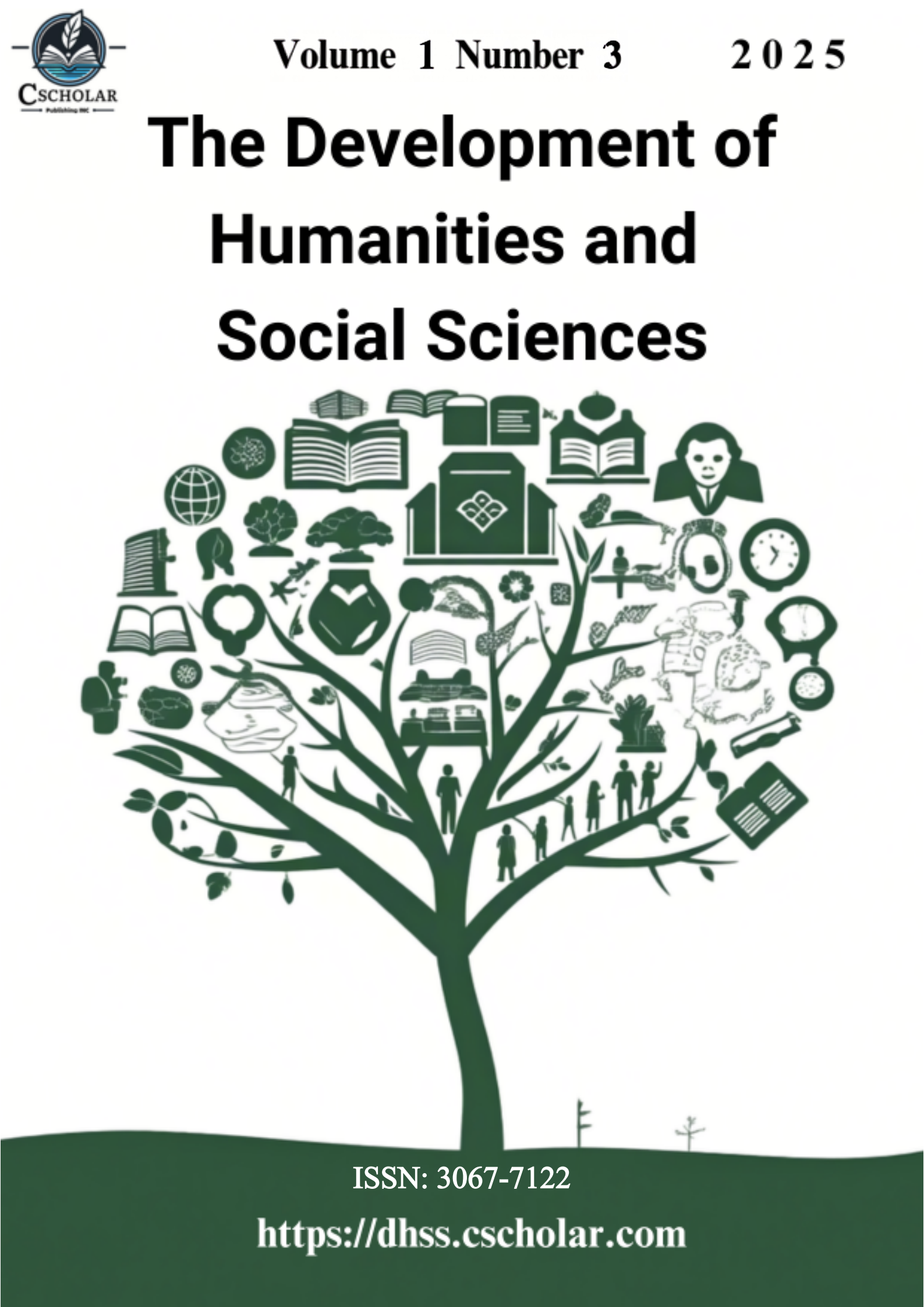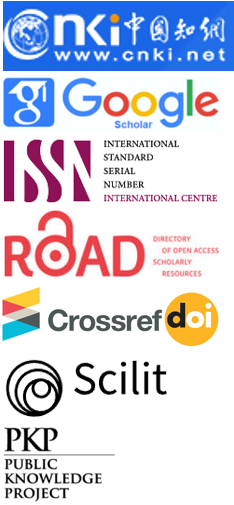The Influence Mechanism of Personality Traits and Teacher Support on Vocal Performance of University Vocal Music Students
DOI:
https://doi.org/10.71204/0a06ct44Keywords:
Personality Traits, Teacher Support, Vocal Performance, Influence Mechanism, Qualitative ResearchAbstract
This study explores how student personality traits and teacher support influence vocal performance. Qualitative analysis reveals that teacher support significantly affects vocal performance differently depending on student personality traits. Findings indicate that personalized teacher support enhances vocal performance based on students' traits, offering practical guidance for improving vocal education practices. This study aims to uncover how student personality traits and teacher support impact vocal performance and provide insights for personalized vocal education. Qualitative methods were employed, including interviews and observations with students and teachers at a conservatory. Data analysis identifies how different types of teacher support affect students with varying personality traits. Teacher support significantly influences vocal performance, with different impacts based on personality traits. Extraverted students benefit from emotional support, while introverted students respond better to detailed guidance. Educators can enhance vocal performance by tailoring support strategies to individual personality traits. The findings also suggest developing personalized teacher training to improve support effectiveness. This study offers new insights into how personality traits and teacher support affect vocal performance, improving vocal education practices and contributing to educational policy development and innovation.
References
Alzugaray, F. J. Z., López, Ó. C., McPherson, G. E., & Hernãndez, S. O. (2020). Music Self-Efficacy for Performance: An Explanatory Model Based on Social Support. Frontiers in psychology, 11, 1249.
Bremmer, M., & Nijs, L. (2020). The Role of the Body in Instrumental and Vocal Music Pedagogy: A Dynamical Systems Theory Perspective on the Music Teacher's Bodily Engagement in Teaching and Learning. Frontiers in Education, 5, 79.
Bulut, C. A. D. (2021). Güzel Sanatlar Li̇sesi̇ Vi̇yolonsel Öğrenci̇leri̇ni̇n Bi̇reysel Çalgi Çalişma Alişkanliklarinin Çalgi Performansi Öz Yeterli̇k İnancina Etki̇si̇. The Journal of Academic Social Science Studies, 14(84), 335-346.
Butković, A. (2024). The Personality of Music Students with Diverse Vocal and Instrumental Skills. Psychological Perspectives on Musical Experiences and Skills, 14, 305.
Cao, J. (2024). Enhancing Student Engagement and Learning Outcomes Through Interactive Approaches in College Vocal Music Instruction. Pacific International Journal, 7(1), 131-136.
Castillo-Allendes, A. (2024). What Are the Teachers' Self-Concept and Vocal Behaviors Related to Their Voice as a Working Tool? 10th Convention of the European Acoustics Association Turin, Italy. 457-461. https://doi.org/10.61782/fa.2023.1273
Çeliköz, N., Erişen, Y., & Şahin, M. (2019). Cognitive learning theories with emphasis on latent learning, gestalt and information processing theories. Journal of Educational and Instructional Studies in the World, 9(3),18-33.
Chen, S. (2024). Innovative Teaching of College Vocal Music Courses Aided by Information Integration Technology. Applied Mathematics and Nonlinear Sciences, 9(1), 1-14.
Chen, Y. (2023). On the Development of Vocal Music Literature Courses in Colleges and Universities: Taking Chinese Art Songs as an Example. International Journal of Education and Humanities, 7(2), 174-177.
Cheng, M., Pang, B., Zeng, X., Xu, W., & Chang, Y. (2022). Integration of the traditions of folk-instrumental art into the works of Chinese composers of the 20th and 21st centuries. Rupkatha Journal on Interdisciplinary Studies in Humanities, 14(2), 1-17.
Chudari, I. N., Mashudi, E. A., & Fatihaturosyidah, F. (2020). Achieving Ideal Career: Improving Student’s Career Self Efficacy Through Career Counseling Sessions Based on H.B Gelatt's Decision Theory. Progcouns Journal of Professionals in Guidance and Counseling, 1(2), 71-84.
Cui, C. (2021). Western and Chinese Musical Traditions in 20th Century China: Developing an American Pedagogy for “Chinese Classical Poetry Art Song” University of Georgia].
Desire, F., Berg, H. F., Mitchell, R. M., & Paulmann, S. (2019). Exploring the Effects of Personality Traits on the Perception of Emotions From Prosody. Frontiers in psychology, 10, 184.
Hao, J., Zhong, Y., Li, H., Li, J., & Zheng, M. (2023). The effect of instrumental and vocal musical experience on tone categorical perception in individuals in a Chinese dialect area. Frontiers in Education, 8, 1274441.
Heriani, A. (2024). Career Counseling Using a Trait and Factor Approach to Help Students in Making Career Decisions. Edumaspul - Jurnal Pendidikan, 8(1), 11-14.
Holman, D. J., & Hughes, D. J. (2021). Transactions between Big‐5 personality traits and job characteristics across 20 years. Journal of Occupational and Organizational Psychology, 94(3), 762-788.
Hou, W. (2023). Diversified Curriculum Innovation in College Vocal Music Education Under Deep Learning Modeling. Applied Mathematics and Nonlinear Sciences, 9(1). https://doi.org/10.2478/amns.2023.2.01069
Hu, S. (2024). Application of Big Data Technology in Vocal Music Teaching. Proceedings of the 3rd International Conference on Internet Technology and Educational Informatization, ITEI 2023, November 24–26, 2023, Zhengzhou, China. https://doi.org/10.4108/eai.24-11-2023.2343731
Jones, A. F. (2020). Circuit Listening: Chinese Popular Music in the Global 1960s. U of Minnesota Press.
Kaleńska-Rodzaj, J. (2023). Emotionality and performance: An emotion-regulation approach to music performance anxiety. Musicae Scientiae, 27(4), 842-861.
Katz, M. (2020). Social and Psicho-Pedagogical Conditions for the Acquisition of Professional Skills of a Modern Vocalist in Open Educational Stipulations. Contemporary Problems of Social Work, 6(1), 29-37.
Khan, C. (2020). Methodological Preparation of Future Musical Art Teachers for Schoolchildren’s National Culture Formation by Means of Folksong Creativity. Редакційна колегія, 103, 487–500.
Lewis, M., & Hendricks, K. S. (2022). “It’s Your Body, It’s Part of Who You Are!”: Influences Upon Collegiate Vocalists’ Performance Self-Efficacy Beliefs. International Journal of Music Education, 40(4), 514-529.
Lin, H.-R., Kopiez, R., Müllensiefen, D., & Hasselhorn, J. (2022). Predicting academic achievement in music in secondary schools: The role of personality and self-theories of musicality. Psychology of Music, 50(6), 2077-2088.
Liu, C., Wan, P., Tu, Y.-F., Kai, C., & Wang, Y. (2021). A WSQ-based Mobile Peer Assessment Approach to Enhancing University Students’ Vocal Music Skills and Learning Perceptions. Australasian Journal of Educational Technology, 1-17.
Liu, J., & Zhou, M. (2021). The role of innovative approaches in aesthetic vocal performance. Revista Música Hodie, 21, 1-16.
Lu, J. (2023). Research and Analysis of Vocal Music Teaching Practice in Universities Based on the Concept of STEAM Education. 4th International Conference on Language, Art and Cultural Exchange (ICLACE 2023),
Minors, H. J., Östersjö, S., Dalagna, G., & Salgado Correia, J. (2024). Teaching Music Performance in Higher Education: Exploring the Potential of Artistic Research. In: Open Book Publishers.
Nagórka, Ł., & Tempczyk-Nagórka, Ż. (2024). Tutoring as a form of work and preventive activity by music school teachers. Issues in Childhood Care and Education, 629(4), 3-16.
Nauzeer, S., & Jaunky, V. C. (2021). A meta-analysis of the combined effects of motivation, learning and personality traits on academic performance. Pedagogical Research, 6(3), 1-23.
Ngobeni, N. C. (2024). Exploring The Connection of Passion and Motivation in Higher Education Singing and Choral Training in Music Performance Education. e-BANGI Journal, 21(2), 128-138.
Özcan, A. (2023). The Mediating Role of Education in the Effect of 5 Factor Personality Traits on Career Planning: Health Sector Example. Nişantaşı Üniversitesi Sosyal Bilimler Dergisi, 11(Özel Sayı), 384-403.
Panda, S. (2023). Exploring the Mediating Effect of Personality Traits in the Relationship Between Entrepreneurial Intentions and Academic Performance Among Students. Plos One, 18(11), e0293305.
Peng, L. (2023). Research on Vocal Music Learning of College Students in Henan Province: Self-Efficacy and Cognition. Journal of Social Science and Humanities, 6(2), 27-31.
Radil, A. I., Goegan, L. D., & Daniels, L. M. (2023). Teachers’ Authentic Strategies to Support Student Motivation. Frontiers in Education, 8, 1040996.
Ritchie, L., & Sharpe, B. T. (2021). Music Student’s Approach to the Forced Use of Remote Performance Assessments. Frontiers in psychology, 12, 641667.
Sari, T., Atik, S., & Çelik, O. T. (2021). Do the Personality Traits of Teacher Candidates Predict the Perception of Self-Efficacy and Alienation From School? Participatory Educational Research, 8(4), 439-453.
Sui, L., Qin, H., Ned, J., & Sun, L. (2020). Personality Traits and Job Exploration Among Latino Business Students: An Exploratory Investigation. Psychology in the Schools, 58(1), 18-32.
Sun, J. (2023). Construction of Intrinsic Schemes for Eigen-Computation Based on the Polyhedron Grid Matrix in 3-D. Scientia Sinica Mathematica, 53(6), 859.
Tahirbegi, D. (2021). Higher Music Education Students’ Experiences and Management of Performance Anxiety: A Qualitative Study. Psychology of Music, 50(4), 1184-1196.
Turda, S. (2024). The Relationship Between Personality Factors, Vocational Identity and Career Decision-Making Self-Efficacy. International Journal for Research in Vocational Education and Training, 11(1), 55-75.
Wang, K., & Webb, M. (2023). Seeking best practice: A systematic review of literature on Chinese music teaching and learning in Western classroom contexts. International Journal of Music Education, 02557614231175988.
Wang, X. (2022). Psychology Education Reform and Quality Cultivation of College Music Major From the Perspective of Entrepreneurship Education. Frontiers in psychology, 13, 843692.
Wang, Y. (2024). Vocal education in higher educational institutions in China: student motivation and creativity. Interactive Learning Environments, 32(3), 813-823.
Wong, J. Y. (2020). Chinese musical culture in the global context–modernization and internationalization of traditional Chinese music in twenty-first century. Chinese culture in the 21st century and its global dimensions: Comparative and interdisciplinary perspectives, 105-122.
Xi, C. (2024). Features and Problems of Professional Vocal Education and Reform Exploration in Modern China. International Journal of Innovative Technologies in Social Science,(1), 41.
Yang, S. (2024). Analysis of the Role and Influence of Sight-Singing and Ear Training on Vocal Learning Skills. Applied Mathematics and Nonlinear Sciences, 9(1), 1-16
Yue, W. (2023). Integrated Education for Music Pedagogy Students in Ukraine and China. The Modern Higher Education Review, (8), 23-32.
Zakaria, A., Ahamd, S. S., & Alhady, S. M. A. S. A. (2023). The Effect of Personality Traits Towards University Students’Performance. Advanced International Journal of Business, Entrepreneurship and SME'S (AIJBES), 5(16), 26-34.
Zelenak, M. S. (2020). Developing Self-Efficacy to Improve Music Achievement. Music Educators Journal, 107(2), 42-50. https://doi.org/https://doi.org/10.1177/0027432116664513.
Zhang, C. (2023). The Importance of Emotional Expression in Vocal Performance Art in the Internet Era. Applied Mathematics and Nonlinear Sciences, 9(1), 20230338.
Zhang, G. (2022). Environment‐Friendly Vocal Music Ecological Education: Sustainable Development of Vocal Music Education From the Perspective of Building. Journal of Environmental and Public Health, 2022(1), 5168389.
Zhang, Y. (2020). Combination of Classical and Popular in College Music Teaching. Learning & Education, 9(2), 88.
Zhang, Y. (2023). Optimization of Diversified Teaching Mode of Vocal Singing in Colleges and Universities by Integrating Audio-Visual and Multi-Sensory Senses. Applied Mathematics and Nonlinear Sciences, 9(1),1-12.
Zhu, Y. (2024). Construction on Vocal Music Teaching and Training Mode in Colleges and Universities Based on Data Fusion Technology. Advances in Educational Technology and Psychology, 8(3), 117-125.
Downloads
Published
Issue
Section
Categories
License
Copyright (c) 2025 Mengying Hu, Geetha Noryati Alias (Author)

This work is licensed under a Creative Commons Attribution 4.0 International License.
All articles published in this journal are licensed under the Creative Commons Attribution 4.0 International License (CC BY 4.0). This license permits unrestricted use, distribution, and reproduction in any medium, provided the original author(s) and source are properly credited. Authors retain copyright of their work, and readers are free to copy, share, adapt, and build upon the material for any purpose, including commercial use, as long as appropriate attribution is given.





